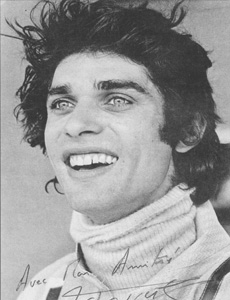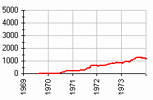Гонщики, C | |
Cévert, François Курсивом отмечены гонщики, |
| Франсуа СэверCévert, FrançoisCevert, Albert Francois |
 (c) 'Who is Who' by Steve Small, 2000 Родился: 25.02.1944 Париж Умер: 06.10.1973 трасса Уоткинс-Глен, Нью-Йорк, США Сезонов в Ф1: Лет в Ф1: 5 Гран При: Старты: 47* *не стартовал: 9 Победы: - подряд: Подиумы: - подряд: 2 Поул-позиции: - подряд: Первый ряд: - подряд: Быстрые круги: - подряд: Лучший финиш: Лучший старт: 2 Дубли: Хет-трики: Лидирование старт/финиш: Большие шлемы: Круги: - лидирования: 129 Километры: - лидирования: |
Год | Команда | Шасси |
Cevert's immense natural talent had been nurtured and developed over a four-year period in the Tyrrell team. He had been given what amounted to a personal master-class in the art of Grand Prix racing by Jackie Stewart and learned so well that at the time of his shocking death at Watkins Glen in 1975 he was the finished article, ready to assume the mantle of a champion after his team leader's impending retirement.
A Volant Shell award had seen François begin his racing career in 1967 at the wheel of his prize, an F3 Alpine. The season was something of a disaster, with the old car proving very unreliable. Undismayed by this, he bought a Tecno for the following year and, after getting to grips with its inherent understeer, went on to take the French FB championship. So impressed were the Italian manufacturers that they offered Cevert a place in their Formula 2 team for 1969, and despite his lack of experience he took third place in the championship and a win in the Tropheés de France meeting at Reims. François also made his Grand Prix debut in the car in the Formula 2 class of the German GP.
For 1970 he planned another season with Tecno as well as finally accepting an offer to drive for Matra in sports cars, which came via his brother-in-law Jean-Pierre Beltoise. But when Johnny Servoz-Gavin suddenly retired in mid-season, Cevert took over the Tyrrell drive and his perspective had suddenly changed. Playing himself in sensibly with the March 701, the Frenchman scored a satisfying sixth place at Monza, but he really blossomed in 1971 with the superb Tyrrell, taking two excellent second places behind his leader at Paul Ricard and the Nürburgring before posting his first (and only) Grand Prix win in the US GP.
The 1972 Formula 1 season was more difficult, perhaps not helped by Stewart's illness, and Cevert finished in the points on only three occasions. He also drove quite regularly in other formulae, dovetailing appearances in John Coombs' Elf-backed March in F2 with a full Can-Am programme (which saw a win at Donnybrooke) and a one-off drive at Le Mans, where he took a splendid second place for Matra with Howden Ganley. Tyrrell were back at their best in 1973. Stewart, already intending to retire after one last season, used all his considerable gifts to take a third World Championship with François right behind him, the apprentice having matured to the point that he could now be the faster man on occasion. Certainly it was felt that Cevert could have taken the German GP if he had so chosen, but in the event he had to be content with no fewer than five second-place finishes before that fateful day at Watkins Glen in October when, attempting to take pole position, he lost control of his car on a bumpy part of the track, the Tyrrell being hurled into the barriers with such ferocity that François stood no chance of survival. France's most likely World Champion was gone, and Ken Tyrrell had lost the man who could perhaps have kept his team at the pinnacle in the post-Stewart era.
(c) 'Who is Who' by Steve Small, 2000
| © WildSoft, 1995-2020 |


